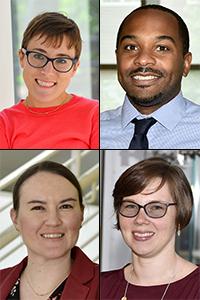
Credit: University of Maryland
Four faculty members of the University of Maryland’s A. James Clark School of Engineering — Shelby Bensi, Gregg Duncan, Katrina Groth, and Katharina Maisel — are recipients of CAREER grants, the National Science Foundation (NSF)’s most prestigious award in support of early-career faculty.
The CAREER (Faculty Early Career Development) Program supports exemplary junior faculty who have the potential to serve as academic role models in research and education and to lead advances in the mission of their department or organization. Activities pursued by early-career faculty build a firm foundation for a lifetime of leadership in integrating education and research.
“Congratulations to Shelby, Gregg, Katrina, and Katharina on their career milestones. Maryland engineers strive for work that advances our profession and helps improve lives, and a CAREER award acknowledges they’re doing both,” said Robert Briber, interim dean of the Clark School. “We’re proud to help set the national engineering agenda. Keep your eye on Maryland!”
Michelle (Shelby) Bensi, Assistant Professor
Department of Civil & Environmental Engineering
Natural hazards often come in bundles: an earthquake, for instance, may lead to flooding if dams or levees break. Risk mitigation needs to consider these multi-hazard events, yet experts who perform hazard assessments generally address each type of hazard in isolation, without investigating the ways in which multiple hazards could combine.
Bensi has set out to close the gap in hazard assessment by developing tools and strategies that can guide our understanding of more complex types of risk. In her NSF-funded research, Bensi will seek to develop a common lexicon as well as a mathematical framework that will enable specialists in different hazard areas to communicate and collaborate effectively. To do so, she will employ probabilistic graphical models known as Bayesian networks.
Gregg Duncan, Assistant Professor
Fischell Department of Bioengineering
Adeno-associated virus (AAV) has emerged as a leading therapeutic gene delivery system and recently became the first virus granted approval by the U.S. Food and Drug Administration for clinical use. Because AAV has not been shown to cause any known human disease, bioengineers are working to harness the virus for critical gene therapy applications.
Recognizing this, Duncan and his team are investigating how AAV interacts with components of the bloodstream and tissues like the brain, liver, and heart. Their aim is to develop new tools to comprehensively assess biological barriers to AAV gene therapy in order to optimize its performance and maximize therapeutic benefits in diseases such as arthritis, cancer, and hemophilia. Along with their work in the lab, Duncan and his team will apply the NSF award toward launching a summer research immersion program for high school science teachers in Baltimore City with the goal of promoting research exposure for underrepresented students.
Katrina Groth, Assistant Professor
Department of Mechanical Engineering
Groth believes there’s no such thing as a completely safe system: “Instead of a safety-at-all-costs mindset, what we need is the ability to anticipate, prepare for, and mitigate risks.”
The field of risk assessment is important not only for regulating existing technologies, such as nuclear power, but also for emerging ones, such as autonomous vehicles or–farther down the road–cars powered by hydrogen fuel cells.
In her NSF-funded research, Groth plans a significant rethink of her field by leveraging techniques from two different areas: probabilistic risk assessment and prognostics and health management. The former, applied typically to large-scale systems such as power plants, employs logic models to determine when, how, and why the system could fail. The latter, often applied to smaller systems such as pumps, depends on using sensors to monitor system status and flag any anomalies or breakdowns.
Katharina Maisel, Assistant Professor
Fischell Department of Bioengineering
Vaccines and immunotherapies target the immune system; for decades, scientists have shown that targeting therapies to the lymph nodes–the body’s immune system “command center”–can significantly enhance the efficacy of both vaccinations and immunotherapies. Methods to target the lymph nodes typically rely on direct injections, but Maisel is investigating another tactic: tapping the lymphatic vessels’ transport function to deliver therapies to the lymph nodes.
Similar to how blood vessels carry blood throughout the human body, lymphatic vessels carry lymph, a fluid largely composed of white blood cells and antibodies that plays an integral role in the body’s defense against viruses and other pathogens. Maisel is exploring how the material properties of tissues, such as shape, surface chemistry, and fluid flow, affect how nanoparticles can be used to transport a payload via the lymphatic vessels.
###
The A. James Clark School of Engineering at the University of Maryland serves as the catalyst for high-quality research, innovation, and learning, delivering on a promise that all graduates will leave ready to impact the Grand Challenges of the 21st century. The Clark School is dedicated to leading and transforming the engineering discipline and profession, to accelerating entrepreneurship, and to transforming research and learning activities into new innovations that benefit millions. Follow us online at eng.umd.edu.
Media Contact
Melissa L. Andreychek
[email protected]
Original Source
https:/




